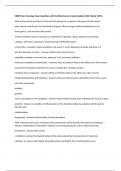CDRE Prep- Oncology Exam Questions with Verified Answers Latest Update 2024 ( Rated 100%)
Most cancers occur by chance as the result of damage to our genes. Many genes in the human
body help to control how our cells divide and grow. When changes (called mutations) occur in
those genes, a cell may lose that control.
• Gene mutations may be caused by a combination of genetics, aging, exposure to chemicals,
radiation, hormones, behavioral, environmental and lifestyle factors.
• Over time, a number of gene mutations may occur in a cell, allowing it to divide and grow in a
way that becomes a cancer. - Answers What is the cause of cancer
unhealthy workplace environments, exposure to air and water pollution,
chemicals, pesticides and herbicides - Answers what are external factors that affect your risk of cancer
account for the largest proportion of cancers; include diet, smoking, alcohol,
inactivity and sun exposure - Answers What are lifestyle factors that affect your risk of cancer
include both genetics and infections - Answers what are internal factors that affect your risk of cancer
poor diet and obesity
smoking
genetics
next is carcinogens in the workplace - Answers three lifestyle factors that contribute the most to cancer
enteritis - Answers A condition of inflammation of the intestines following radiation which leads to
diarrhea and
malabsorption
Hypogeusia - Answers Deterioration of taste perception
TNM T denotes tumor size, N denotes node involvement and M denotes the extent of metastases. -
Answers classification is intended to indicate a worsening prognosis as the numbers increase.
Xerostomia - Answers Dry mouth
I. Initiation: involves the transformation of the cell produced by the interaction of chemicals,
radiation, or viruses with cellular deoxyribonucleic acid (DNA). The transformation occurs
,rapidly, but the resultant cell remains dormant for a variable period until activated by a promoting
agent
II. Promotion: initiated cells are activated by a promoting agent to multiply and form a discrete
tumor
III. Progression: phase in which tumor cells aggregate, grow autonomously and form benign tumors
that eventually lead to a malignant phenotype with capacity for tissue invasion and metastasis - Answers
Carcinogenesis is often described in three progressive phases:
a. Carcinomas: cancers that form in the cells that affect the skin, mucous membranes, glands, throat,
lungs and internal organs
b. Sarcomas: cancers that affect muscles, connective and fibrous tissues, bones and some organs
c. Leukemia: cancers of blood-forming tissues, arise from white blood cells in the blood or bone
marrow
d. Lymphomas: cancers that affect the lymphatic system; originate in the lymphocyte cells --white
blood cells that help fight infection-- found in the blood, spleen and nodes - Answers What are the 4
types of cancer
Low fruit and vegetable intake
• Low whole grain (fiber) intake
• High caloric intake leading to obesity
• High intake of dietary fat
• High intake of alcohol - Answers What are the major dietary risks with cancer
1) Choose a diet rich in a variety of plant-based foods.
2) Eat plenty of vegetables and fruits.
3) Maintain a healthy weight and be physically active.
4) Drink alcohol only in moderation, if at all.
5) Select foods low in fat and salt.
6) Prepare and store food safely.
, 7) Do not use tobacco in any form. - Answers what are 7 practical ways to reduce cancer risk
data strongly support the association between consumption of plant based foods
and reduced risk of cancers of the lung, colon and rectum. Plant based foods contain the essential
nutrients that support optimum tissue and organ responses, antioxidants, dietary fibers, and
phytochemicals. They act to inhibit cancer by functioning as inhibitors of neoplastic formation,
suppressers of free radical production, bulking agents to dilute carcinogens and decrease GI transit
time and stimulators of physiologically active anti-cancer enzymes. - Answers What is the data behind
fruits and vegetables and cancer
The consumption of foods containing dietary fibre protects against colorectal cancer. Fibre intake in the
range of 25-29 g/day is adequate with additional health benefits likely at intakes >30 g/day - Answers
Dietary fibre and cancer recommendation
colon cancer - Answers Epidemiological data provides consistent evidence that low levels of physical
activity are associated with an increased risk of
mouth, pharynx, larynx, esophagus, colorectum (men) and breast. - Answers Epidemiological data
provides consistent evidence that consumption of any type of alcoholic drink (i.e. beer, wine,
spirit/liquor) is associated with cancers of the
colorectal cancer - Answers Consistent evidence from a number of cohort studies suggests that
consumption of red meat and processed meat is associated with an increased risk of
Current recommendations suggest that individuals consume less than 500 grams of red meat per week
and consume very little if any processed meat (i.e. meat preserved by smoking, curing or salting or
addition of chemical preservatives - Answers red meat and processed meat recommendations
Emerging evidence from large-scale prospective observational studies have consistently shown that the
consumption of approximately two servings/day of soy foods is not associated with an increase in the
risk of breast cancer recurrence or lower risk of survival in women with breast cancer. The protective
association appears more pronounced in postmenopausal women. However, the reduced risk of
recurrence results should be interpreted with caution given the modest effect and wide confidence
intervals for most studies and the lack of dose response relationship in one positive study - Answers
current recommendations for soy and cancer
fish
foods containing vitamin C
multivitamin supplements. - Answers There is some limited evidence for a beneficial effect of the
following foods and the reduced colorectal cancer risk




